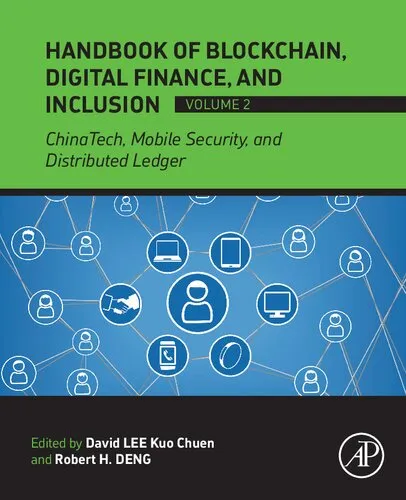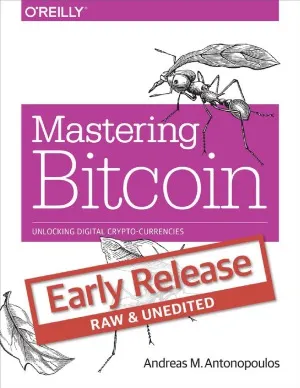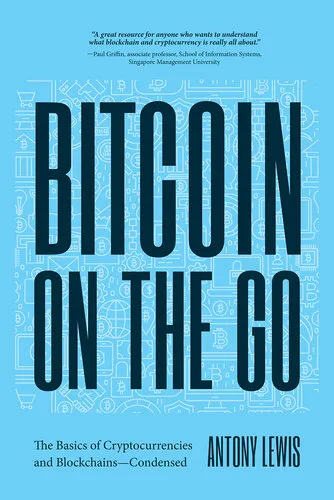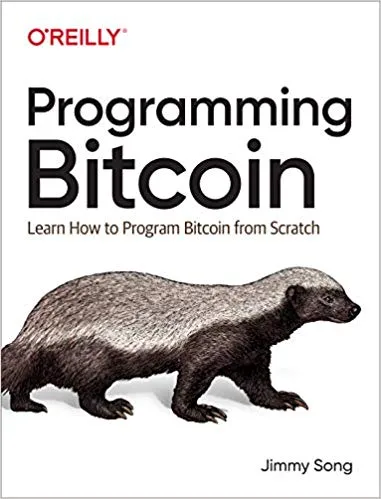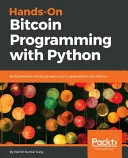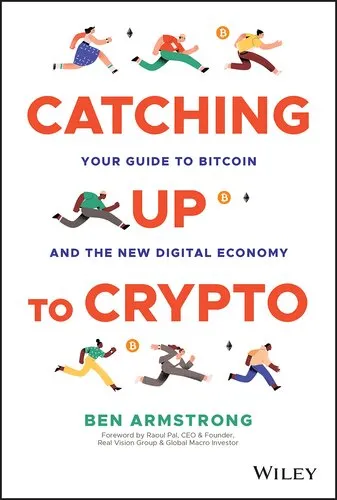Handbook of Blockchain, Digital Finance, and Inclusion, Volume 1: Cryptocurrency, FinTech, InsurTech, and Regulation
4.5
بر اساس نظر کاربران

شما میتونید سوالاتتون در باره کتاب رو از هوش مصنوعیش بعد از ورود بپرسید
هر دانلود یا پرسش از هوش مصنوعی 2 امتیاز لازم دارد، برای بدست آوردن امتیاز رایگان، به صفحه ی راهنمای امتیازات سر بزنید و یک سری کار ارزشمند انجام بدینکتاب های مرتبط:
مقدمهای بر کتاب "Handbook of Blockchain, Digital Finance, and Inclusion, Volume 1: Cryptocurrency, FinTech, InsurTech, and Regulation"
کتاب "Handbook of Blockchain, Digital Finance, and Inclusion, Volume 1" با تمرکز بر موضوعات گستردهای مانند Blockchain، FinTech، و Cryptocurrency، یکی از منابع جامع و پیشرو در زمینه تحلیل فناوریهای دیجیتال و نحوه تأثیرگذاری آنها بر دنیای مالی است. این کتاب به بررسی تحولات عمیق در دنیای مالی ناشی از فناوری دیجیتال میپردازد و اهمیت تنظیم مقررات را در این عصر جدید تبیین میکند. نویسندگان این اثر، دیوید لی کوو چون و رابرت اچ. دنگ، تخصص خود را بهکار بردهاند تا اطلاعاتی جامع و کاربردی را در اختیار دانشگاهیان، حرفهایها و سیاستگذاران قرار دهند.
خلاصهای جامع از کتاب
این کتاب به چهار حوزه کلیدی تقسیم میشود: فناوری Blockchain، دنیای نوظهور FinTech و InsurTech، ابزارها و فرصتهای Cryptocurrency، و مقررات مرتبط با این فضاها. نویسندگان اهمیت فناوری Blockchain را به عنوان زیربنای بسیاری از نوآوریها توضیح میدهند و نقشی که این فناوری در ساخت اعتماد، کاهش هزینهها، و بهبود امنیت بازی میکند را موشکافی میکنند. در بخش دیگری از کتاب، FinTech و InsurTech به صورت عمیق بررسی شدهاند و به نقش شرکتهای فناوری مالی در تحول سیستمهای بانکی، ارائه خدمات سریعتر، و کاهش بوروکراسی پرداخته شده است.
همچنین، کتاب تمرکز ویژهای بر دنیای ارزهای دیجیتال مانند Bitcoin و Ethereum دارد و نه تنها عملکرد فنی آنها، بلکه اثرات اقتصادی، اجتماعی، و فرهنگی این فناوریها را نیز تحلیل میکند. این کتاب به خوانندگان کمک میکند تا مزایا، چالشها، و پیشبینیهای احتمالی را برای آینده این فناوریها درک کنند. در نهایت، فصل پایانی به تنظیم مقررات و چالشهای مرتبط در سطح جهانی اشاره میکند، و نویسندگان به طور خاص بر اهمیت تدوین سیاستهای منطقی برای تسهیل نوآوری و در عین حال حفظ امنیت تأکید دارند.
نکات کلیدی
- Blockchain فناوریای است که نه تنها برای ایجاد اعتماد در سیستمهای مالی، بلکه برای کاهش هزینهها استفاده میشود.
- Cryptocurrency مفاهیم آزادی مالی و کنترل فردی را به اوج میرساند، اما چالشهای امنیتی و نوسانات قیمت را نیز به همراه دارد.
- FinTech و InsurTech دو عرصه تحولآفرین هستند که نقش مؤثری در سادهتر کردن فرآیندهای مالی و بیمه دارند.
- تنظیم مقررات در عصر دیجیتال، اهمیت فوقالعادهای در جهتدهی صحیح به نوآوریها دارد.
نقلقولهای برگزیده از کتاب
"Blockchain is not just a technology; it is a transformation of mindset about trust and transparency."
"The future of finance lies in a harmonious balance between regulation and innovation."
چرا این کتاب مهم است؟
فناوریهای دیجیتال و مالی در حال تغییر دادن چشمانداز اقتصادی جهان هستند، و این کتاب یکی از معدود منابعی است که این تغییرات را با دقت و عمق بررسی کرده است. با ارائه تحلیلهای علمی و کاربردی، این اثر به متخصصان، دانشجویان، و سیاستگذاران کمک میکند تا فهم بهتری از چالشها و فرصتهای موجود پیدا کنند. علاوه بر این، موضوعات نوآورانهای که در این کتاب پوشش داده شدهاند به مخاطبان این امکان را میدهند تا درک روشنی از آینده فناوریهای مالی و تأثیر آنها بر اقتصاد جهانی داشته باشند.
اگر به دنبال کتابی هستید که نهتنها زوایای مختلف فناوری مالی را توضیح دهد، بلکه نقشه راهی برای استفاده از این فناوریها ارائه کند، این کتاب انتخابی بینظیر است. تأکید بر ضرورت تنظیم مقررات و تحلیلهای چندجانبه از فناوری Blockchain، FinTech و InsurTech، این اثر را به یکی از مهمترین منابع در زمینه مالی دیجیتال تبدیل کرده است.
Introduction to "Handbook of Blockchain, Digital Finance, and Inclusion, Volume 1"
"Handbook of Blockchain, Digital Finance, and Inclusion, Volume 1: Cryptocurrency, FinTech, InsurTech, and Regulation" is an essential guide for industry professionals, academics, businesses, regulators, and anyone intrigued by the dynamic and ever-evolving landscape of blockchain technology and digital finance. Authored by David Lee Kuo Chuen and Robert H. Deng, this book is a comprehensive exploration of key innovations and critical challenges surrounding modern financial technologies (FinTech), cryptocurrency, insurance technology (InsurTech), and their associated regulations.
With technology rapidly shaping our global economic systems, the book delves into how blockchain has emerged as a groundbreaking force transforming verticals across industries. Highlighting both opportunities and potential pitfalls, it equips readers with a balanced understanding of the mechanisms, applications, and implications of these technologies. This volume particularly stresses the convergence of technological innovation with financial inclusion, shedding light on its capacity to foster social and economic progress worldwide.
Detailed Summary of the Book
The "Handbook of Blockchain, Digital Finance, and Inclusion, Volume 1" offers a deep dive into four key areas – blockchain technology, cryptocurrency, FinTech, and InsurTech – while placing these in the context of global regulatory frameworks. It is carefully structured to provide both theoretical underpinnings and practical insights, making it a well-rounded resource for its diverse readership.
This book starts by explaining blockchain's architecture, showcasing its underlying principles and functionalities. Beyond technical details, it emphasizes blockchain's transformative potential, from enhancing transparency to enabling efficient, decentralized financial systems. Moving into cryptocurrency, the volume explores the rise of digital currencies such as Bitcoin, Ethereum, and beyond, discussing their use cases, challenges like scalability, and policy concerns such as volatility and security threats.
FinTech is another critical component of this book, where developments in digital payment systems, peer-to-peer lending, and financial automation are extensively analyzed. Through real-world applications, the book reveals how FinTech aims to bridge gaps in global financial inclusivity and address inefficiencies in traditional banking systems.
Lastly, the section on InsurTech illustrates how technologies like AI, IoT, and big data are revolutionizing traditional insurance models, creating personalized services, promoting better risk assessment, and enhancing customer experience. Regulatory frameworks and compliance challenges cut across all these domains, underscoring the need for robust yet adaptable governance strategies to balance innovation with risk mitigation.
Key Takeaways
- Blockchain and cryptocurrency are not standalone concepts; they are deeply integrated into modern financial and societal ecosystems.
- FinTech and InsurTech are disrupting conventional banking and insurance practices, creating value for underserved populations.
- While blockchain and digital finance hold transformational potential, challenges like cybersecurity risks, scalability issues, and regulatory uncertainty must be addressed.
- Interdisciplinary collaboration between companies, regulators, and policymakers is essential for building a sustainable digital financial framework.
- The balance between innovation and regulation is critical for nurturing blockchain-based solutions while maintaining public trust.
Famous Quotes from the Book
"Blockchain is not just a technology; it is a mechanism to rebuild trust in a digital era, offering transparency and accountability like never seen before."
"The true potential of cryptocurrency lies not in speculation, but in creating equitable access to financial resources globally."
"In the race for FinTech and InsurTech dominance, companies that prioritize innovation with a strong foundation in ethical practices will lead the way."
Why This Book Matters
In an increasingly digitized world, understanding blockchain, cryptocurrency, FinTech, and InsurTech has never been more important. These technologies collectively hold the key to reshaping global financial infrastructure, democratizing access to financial services, and addressing inefficiencies in legacy systems. This book matters because it provides a thoughtful exploration of these topics, making them accessible to a wide range of readers.
For businesses, it serves as a guide to harnessing the power of blockchain and digital finance for competitive advantage. Academics and researchers will find it valuable as a scholarly resource to further their studies, while regulators and policymakers can glean actionable insights for shaping effective governance. By offering a balanced view of the opportunities and challenges inherent in digital finance, this book establishes itself as a cornerstone for anyone invested in the future of economic and technological progress.
دانلود رایگان مستقیم
شما میتونید سوالاتتون در باره کتاب رو از هوش مصنوعیش بعد از ورود بپرسید
دسترسی به کتابها از طریق پلتفرمهای قانونی و کتابخانههای عمومی نه تنها از حقوق نویسندگان و ناشران حمایت میکند، بلکه به پایداری فرهنگ کتابخوانی نیز کمک میرساند. پیش از دانلود، لحظهای به بررسی این گزینهها فکر کنید.
این کتاب رو در پلتفرم های دیگه ببینید
WorldCat به شما کمک میکنه تا کتاب ها رو در کتابخانه های سراسر دنیا پیدا کنید
امتیازها، نظرات تخصصی و صحبت ها درباره کتاب را در Goodreads ببینید
کتابهای کمیاب یا دست دوم را در AbeBooks پیدا کنید و بخرید
1275
بازدید4.5
امتیاز0
نظر98%
رضایتنظرات:
4.5
بر اساس 0 نظر کاربران
Questions & Answers
Ask questions about this book or help others by answering
No questions yet. Be the first to ask!
